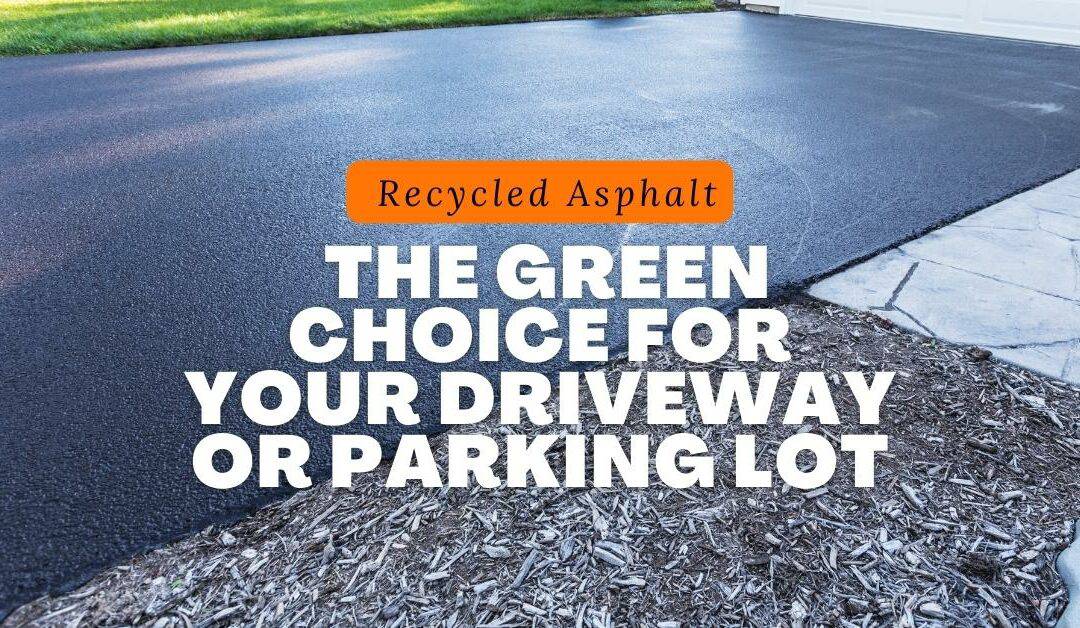Asphalt is one of the most popular choices for driveways and parking lots, and for good reason. It’s durable, weather-resistant, and easy to maintain. But what about when it comes time to replace your asphalt? Many people might think the only choice is to use new asphalt, but recycled asphalt is a great alternative. Recycled asphalt (RAP) comes from reprocessed pavement containing asphalt and aggregates. So, it can be used in different projects, making it a more sustainable option. If you’re wondering if RAP is right for you, keep reading to learn more about its benefits!
What is Recycled Asphalt (RAP)? Where Does It Come From?
Reclaimed asphalt pavement (RAP) comes from the reprocessing of asphalt pavement. Asphalt is one of the most recycled materials in the world. In fact, every year, over 80 million tons of asphalt pavement get recycled into new roads and parking lots.
According to The United States Federal Highway Association (FHA), RAP comes from:
The US annually produces 45 million tons of RAP. This recycling means that asphalt is the green choice for roads, driveways, and parking lots. Paving contractors use it repeatedly instead of it going into landfills or water sources!
The materials that make up the RAP come from:
- Chunks and slabs from full-depth pavement removal
- Plant cleanout
- Reject material or excess returned from jobs
- Excavation
How Paving Companies Use Recycled Asphalt
One of the best things about RAP is that a paving company can add it to almost any asphalt mix. This versatility lets paving contractors use it in many different ways!
The FHA states that RAP is suitable for use in projects such as:
- Driveways
- Parking lots
- Roads
- And more! (FHA, 2011)
If you’re considering a new driveway or parking lot, ask your contractor if they offer RAP. Hiring a recycling paving company enables you to help the environment AND receive a high-quality product.
The Asphalt Processing Facility
A central RAP processing facility contains:
- Crushers: to break down larger pieces
- Screeners: to sort the material by size
- Mills and pulverizers: to further break down the material
- Blenders: to mix RAP with new asphalt (if necessary)
- Storage bins or silos: to hold RAP until it is ready to use
- Conveyors: to transport RAP from one stage of processing to the next
- Stackers: to stockpile RAP until it is ready to ship
Once the processing facility finishes the product, they rate it with the correct gradation. The gradation feres to the distribution of particle sizes in a sample. The gradation of RAP is crucial because it:
- Determines the amount of RAP needed in a mix
- Affects the workability of the mix
- Influences the amount of new asphalt binder needed
Paving companies use RAP that meets the required gradation in any mix. If the RAP does not meet the gradation requirements, the asphalt plant can often still use it by blending it with new asphalt. When a paving company uses recycled asphalt in a blend, the percentage of RAP can range from 0 to 100 percent.
How Does RAP Work to Create Driveways and Parking Lots?
The central processing facility finishes the RAP product with the desired gradation for many different asphalt mixes and applications.
Hot mix asphalt is a paving company’s product for driveways and parking lots. During in-place hot mix asphalt recycling, repaving is either a single or multiple pass operation. This paving process relies on equipment specialized in heating, scarifying, rejuvenating, laydown and compaction.
The hot mix asphalt we use to pave your driveway or a parking lot uses recycled asphalt pavement (RAP) as an aggregate substitute. RAP recycles into the new hot mix asphalt through one of these processes:
- The recycled asphalt pavement (RAP) binder blends with new virgin aggregate and liquid asphalt to produce a new HMA (hot mix asphalt). The recycled material takes the place of some of the pure materials.
- The asphalt paving company combines recycled pavement (RAP) with new aggregate, liquid asphalt, and a binder. The recycled material takes the place of some of the pure materials and binder in the HMA (hot mix asphalt).
- Recycled asphalt pavement (RAP) fully recycles into a new hot mix asphalt without any virgin aggregate or liquid asphalt.
- The RAP is recycled into a new HMA using only liquid asphalt.
This process requires specialized equipment and trained personnel to heat, scarify, rejuvenate, lay down, and compact the recycled hot mix asphalt. However, with an expert paving company, recycled asphalt can be an excellent choice for your driveway or parking lot.
Benefits of Recycled Asphalt
You may wonder how RAP stacks up against brand new asphalt. The reality is that recycled asphalt is a great alternative to hot mix asphalt., Here’s why:
It’s More Cost-Effective
Recycled asphalt is cheaper to produce than new asphalt. This fact means you can save money on your paving project by choosing recycled asphalt over new.
It’s Better for the Environment
As we mentioned before, RAP is a sustainable choice that helps reduce pollution and waste if you’re looking for a way to be more environmentally conscious.
When you choose RAP for your next paving project, you get a high-quality product that will save you money and help the environment. Contact your local asphalt paving contractor today to learn more about RAP and get a free quote!
We Can Help
If you’re considering a new parking lot or driveway, at AMP Paving, we use only the best-graded asphalt mixes that include recycled materials in our asphalt paving services. We know RAP is a sustainable choice that helps reduce pollution and waste. Contact us today to get started with a free quote for your next “green” asphalt project.

